Info for Parents
What’s this?
We get a LOT of parents contacting An Siopa Leabhar with questions, looking for kids books in Irish or for advice on reading to a child in Irish. We’ve built up the following answers so that parents and guardians from other parts of the country (and the world!) can avail of the same information, even if you’re not able to get to us in person.
(We also share this page with learners or people returning to Irish: there’s a big overlap in the materials and what you might find useful.)
If you have another question and you don’t see an answer here, send us an email and we’ll see what we can do!
I’m a parent/guardian and I want to introduce my child to Irish. What do I do?
You could take a look at Gaschaint – a collection of 2,000 phrases broken up into different categories. This is specifically designed for parents, so you can start with a little bit and build on it. So, for instance, you could decide to start using a few words or phrases of Irish at breakfast time or on the way to school until you (yourself and your child) get comfortable with it and bring more in.
Gaeloideachas have released a free PDF with some phrases you can use.
Visit the Irish for Parents website and take a look through the different sections. Some of these may be very useful to you.
Read this PDF put together by Comhluadar (sadly no longer in operation) about raising children with Irish: ‘Speaking Irish at Home: A Guide for Parents‘.
If your child is very small, there are board books available in Irish, and we have a range of these for you to look at. We’d particularly recommend the Bran books (AKA Spot the Dog) and the Babaí Beag books.
Reading aloud, using the Irish you have
We cannot oversell the positive impact you can have by reading aloud to your child – particularly before they can read themselves*. Use whatever words of Irish you have and it will help your child get used to the sounds, and you’ll get into the habit of using the cúpla focal too.
*(You should also definitely try to keep going after they do start to read independently, as their ability to understand spoken word will be miles ahead of their reading age for quite a while – but it’s also completely okay to be learning along with your child.)
What if I don’t understand the words, or pronounce things wrong?
We recommend reading through a book at least once before you read it to your child, to wrap your head around the sounds (especially if you feel your own Irish is a little bit rusty) and to get familiar with what the words all mean. Above all else, this will put you at ease, and with practice you won’t need to do this.
There are some excellent online dictionaries out there if you feel you need to check your vocab: teanglann.ie for general and older terms; tearma.ie for modern terms, official titles, legal terms and the like; focloir.ie for modern phrases and words. You could also get a physical dictionary (which you might need for school anyway) and work with your child to find the words you don’t know.
Not sure how to say something? Type it into abair.ie and it will say it for you (and you can even pick your dialect/accent).
For children a little bit older, there is a wealth of picturebooks, between translations and original content as Gaeilge. We’d recommend a mix of titles originally written in Irish (e.g. Bí ag Spraoi Liom, Scúnc agus Smúirín) and some titles that they might already recognise in English (e.g. The Gruffalo/An Garbhán, Goldilocks and the Three Bears/Cinnín Óir agus na Trí Bhéar).
I want to get better at Irish so I can use it with my child. What should I do?
You’ve got a few options here, and we would recommend you immerse yourself with Irish as much as possible.
Pop on TG4 or use their online player to watch some kids shows or watch some of their fantastic documentaries with subtitles (you can switch off the subtitles on the web player if you don’t need them).
On Twitter/Facebook/Instagram? Include Irish in your social media. Search for #Gaeilge and start following some accounts who post in Irish (like ours! We’re @ansiopaleabhar on all three). Check out Molscéal, Meon Eile, Tuairisc and Nós.
Look for the @Motherfocloir account on Twitter for a new curator each week discussing (in English, mostly) their relationship with Irish or a specific topic related to Irish. Dive into the #DIYGaeilge tag on Twitter and see all the things you can do to get Gaeilge into your life.
Check out #BooksAsGaeilge on Twitter for information about books new and old that are available in Irish (and #BooksAboutGaeilge for learner materials).
Go through the videos for Now You’re Talking over on YouTube.
Listen to as much Irish as you can, even if it’s just having Raidió na Gaeltachta on in the background while you’re doing the washing up, or while you’re commuting, this will be priceless practice with the sounds of Irish and the rhythm of how people speak. Not only is this available on physical radios, but you can listen online with the RTÉ radio player and you can listen back too. Raidió na Gaeltachta also have a number of shows available as podcasts.
Listen to Raidió Rí-Rí and Raidió na Life. Raidió na Life have a whole bunch of shows available to stream on their SoundCloud page. There’s a great app called Seinnteoir that lets you listen to programmes across different Irish-language radio stations.
Listen to Beo ar Éigean, RTÉ’s Irish-language podcast (note: this isn’t specifically geared at learners but does offer a great opportunity to listen to three speakers with different accents talk about day to day, real experiences.)
Many parents who come to us may already have a grammar book of some kind, but may not feel they have the time to use it. Something like Duolingo means Irish can be used in small chunks to strengthen your vocabulary. Got five minutes of a wait somewhere? Pull up Duolingo and flex your Irish brain muscles!
Can you recommend some books to start with?
If you’re trying to improve your own Irish, a great way to get new vocab and get to grips with sentence structure is, of course, reading. There are a few specific sections we would point out for this, depending on your level and what you’re into.
- Novels for learners of Irish (these are books for adults, with a small glossary included), like Fianaise, Dúnmharú ar an Dart, Dialann Emily Porter: An Jailtacht.
- Books aimed at teen and young adult audiences. These are often around the same level as the adult learner novels, e.g. Daideo, Trumptaí Dumptaí agus an Falla Mór, Nóinín, Katfish agus Scéalta Eile.
- Graphic novels and comics (try the one about Cú Chulainn if you want something gritty and engaging; try Asterix or Tintin if you’re looking for some hijinks and humour)
- Books aimed at independent readers. Some learners don’t mind reading children’s books – whereas some people can get quite defensive with us for even suggesting it! Tackle a book that’s going to challenge you and gift you with new vocab – and find a level you can enjoy, without becoming so frustrated that you can’t even get through one page. You’ll know your own level better than we do.
- Books translated into Irish where you might know the original or be able to get your hands on it. Many learners have great success with stories they already know. Some people hate knowing the story before reading and don’t find this at all helpful.
Can you suggest a grammar book?
We recommend Gaeilge Gan Stró – Beginners and Complete Irish for total beginners. If you’re returning to Irish, Gaeilge Gan Stró – Lower Intermediate might be the one for you. If you’ve studied another language (or more!) as an adult, you won’t get better than A Grammar of Modern Irish for a grammar reference in English about Irish.
Are there classes I can take?
Check out Conradh na Gaeilge for courses at different levels from beginners and refresher classes to advanced. Get in touch with eolas (at) cnag (dot) ie to be added to the mailing list about new classes (they sometimes run parent/guardian-and-toddler courses even!).
Gaelchultúr run online courses at www.ranganna.com too!
What you’ll find on this page:
— What’s this?
— I’m a parent and I want to introduce my child to Irish. What do I do? How can I speak Irish to my child?
— Reading aloud, and using the Irish you have
— What if I don’t understand the words, or pronounce things wrong?
— I want to get better at Irish so I can use it with my child. What should I do?
— Can you recommend some books to start with?
— Can you suggest a grammar book for me?
— Are there classes I can take?
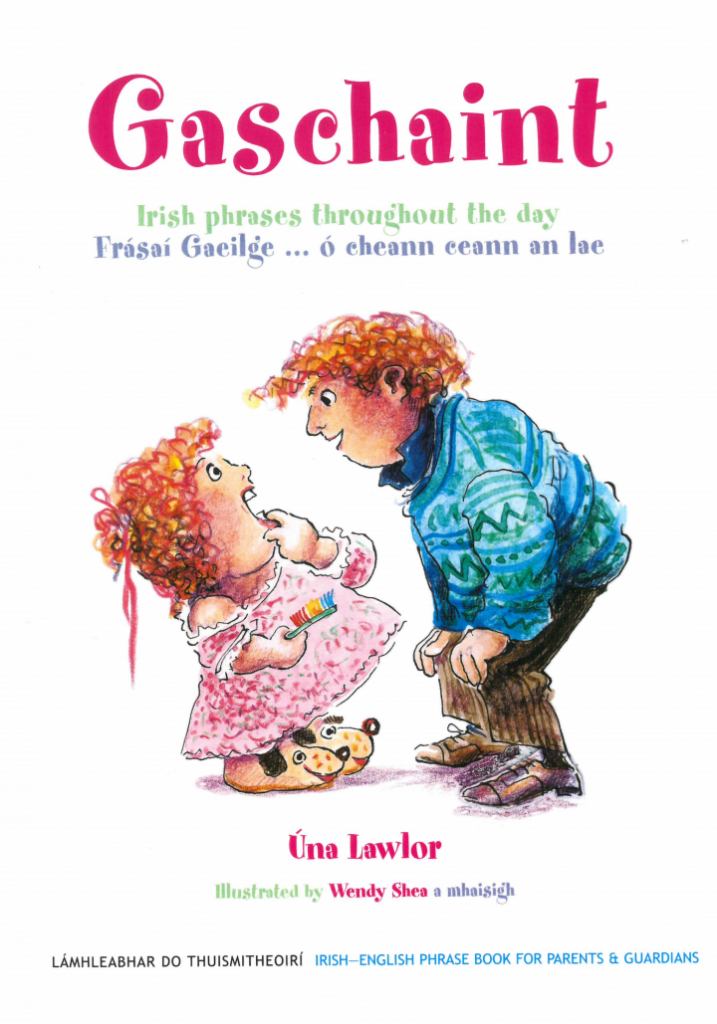
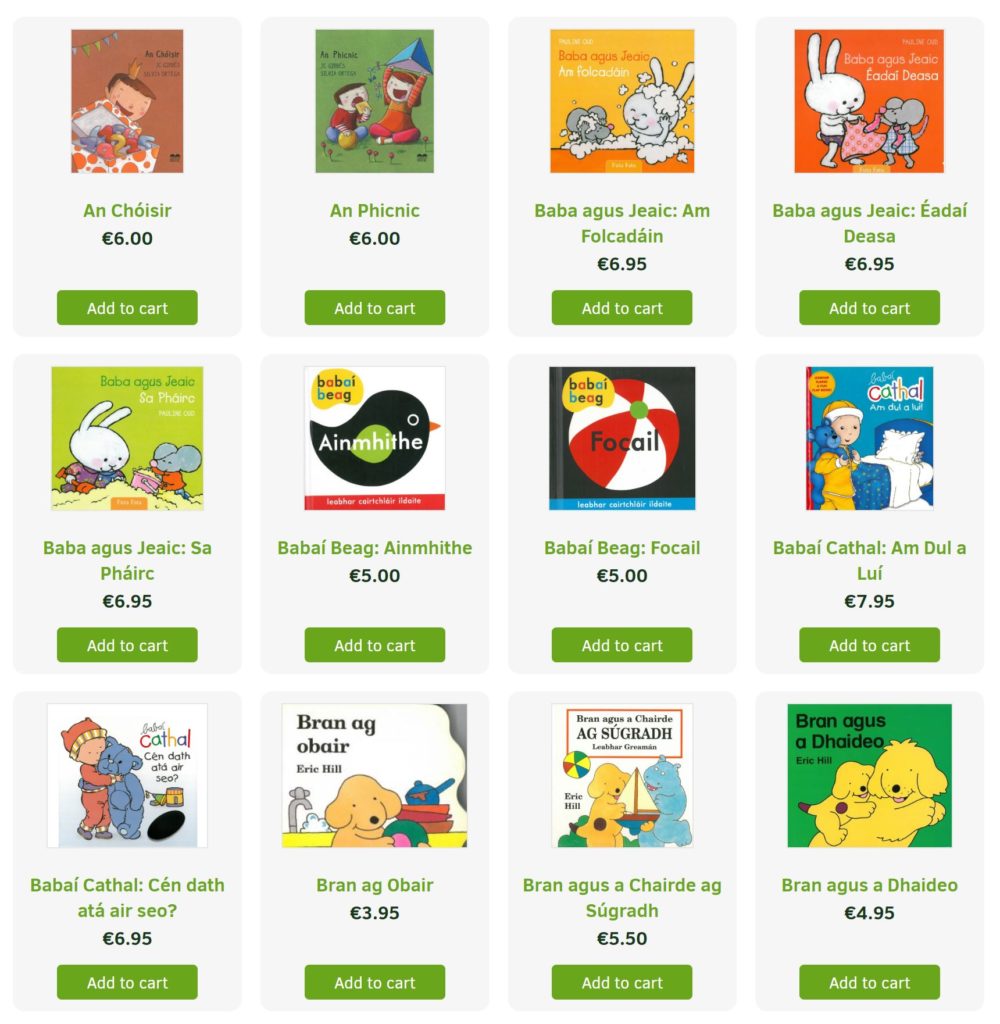
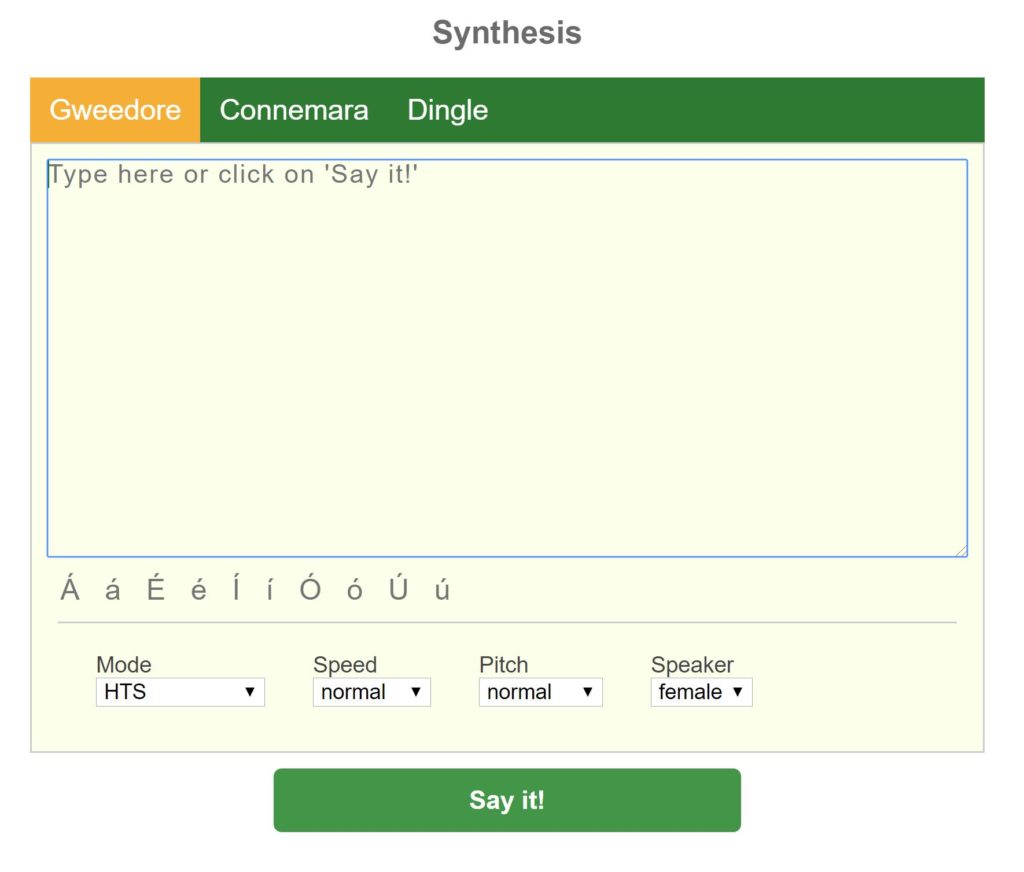
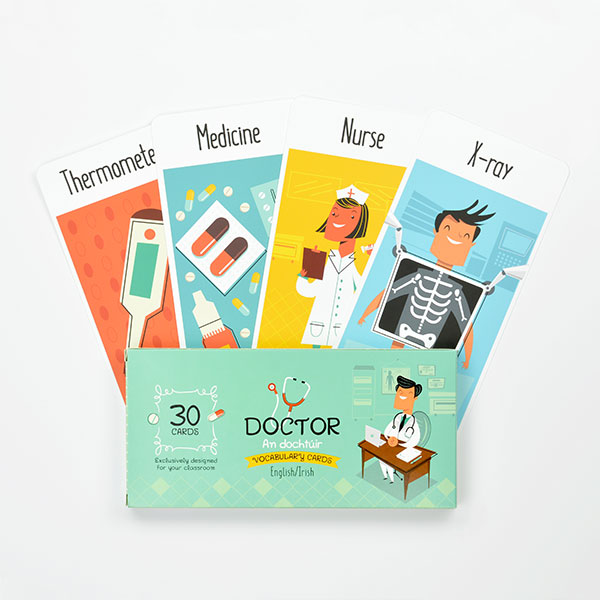
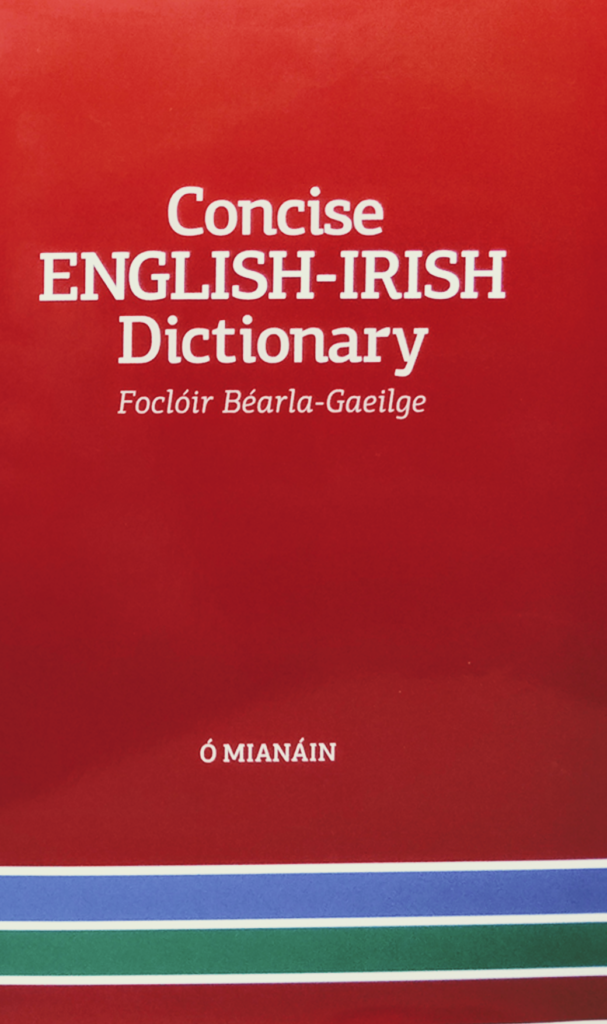

 Shopping Cart 0
Shopping Cart 0 
